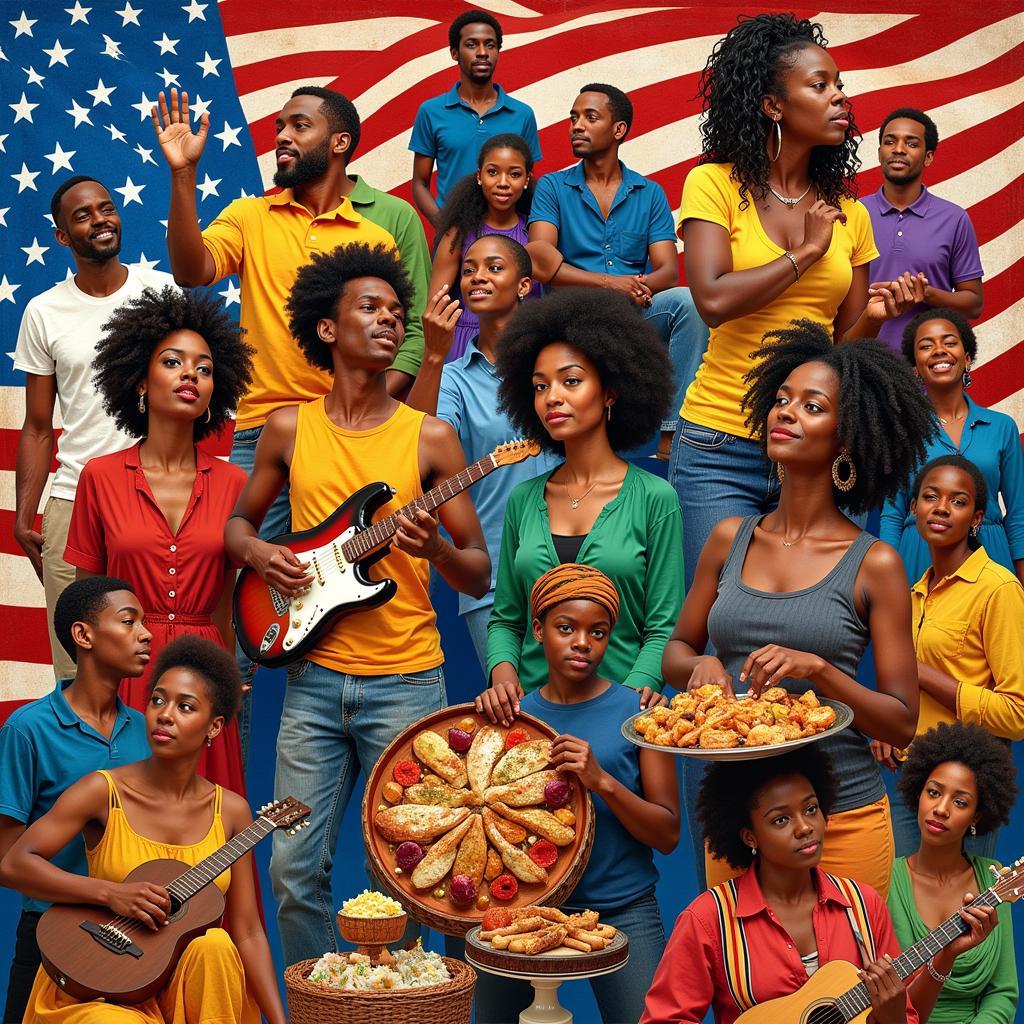A Deep Dive into African American History in the United States
African American History In The United States is a complex and multifaceted story, woven into the very fabric of the nation. From the earliest days of forced arrival to the ongoing struggle for equality, this history is marked by resilience, creativity, and an unwavering pursuit of justice. It’s a story of triumphs and tragedies, of contributions and challenges, a story that continues to shape America today. Let’s delve into this rich history, exploring key periods, pivotal figures, and the enduring impact of African Americans on the nation’s cultural, political, and social landscape.
From Enslavement to Emancipation: A Struggle for Freedom
The earliest chapters of African American history in the United States are tragically defined by the institution of slavery. Millions of Africans were forcibly brought to America, subjected to brutal conditions and denied their basic human rights. Yet, even in the face of unimaginable hardship, they maintained their cultural heritage, creating vibrant communities and fostering a spirit of resistance. This period witnessed the rise of abolitionist movements, fueled by both Black and white activists who fought tirelessly to end slavery. Key figures like Frederick Douglass, Harriet Tubman, and Sojourner Truth emerged as powerful voices for freedom, challenging the moral conscience of the nation.
The Civil War and Reconstruction: A Promise of Equality
The Civil War marked a turning point in African American history, leading to the abolition of slavery and the promise of a new era of equality. The Reconstruction period that followed saw the passage of the 13th, 14th, and 15th Amendments, granting African Americans citizenship, equal protection under the law, and the right to vote. african american history museum outside provides valuable context for understanding this pivotal era. Despite these legal victories, the struggle for true equality was far from over.
The Jim Crow Era: A System of Oppression
The Jim Crow era, which followed Reconstruction, saw the rise of a system of segregation and discrimination that aimed to disenfranchise African Americans and maintain white supremacy. This period was marked by violence, intimidation, and the denial of basic rights. Despite these challenges, African Americans continued to fight for their rights, organizing resistance movements and demanding equal access to education, housing, and employment.
The Civil Rights Movement: A Renewed Fight for Justice
The 20th century witnessed the resurgence of the fight for civil rights. Led by iconic figures like Martin Luther King Jr., the Civil Rights Movement challenged segregation and discrimination through nonviolent protests and civil disobedience. This period saw landmark legislation like the Civil Rights Act of 1964 and the Voting Rights Act of 1965, which dismantled legal segregation and protected the right to vote.
 African American Cultural Contributions: Shaping American Identity
African American Cultural Contributions: Shaping American Identity
African American Culture: A Tapestry of Richness and Resilience
African American culture, deeply rooted in African traditions and shaped by the American experience, has profoundly influenced the nation’s artistic, musical, and literary landscape. From the soulful rhythms of blues and jazz to the powerful narratives of literature and poetry, African American artists have given voice to the joys and struggles of their community. african american culture in the united states explores the vibrant tapestry of African American cultural expressions. Today, institutions like the african american museum atlanta preserve and celebrate this rich heritage.
African American History in the United States: A Continuing Journey
The journey of African Americans in the United States is a testament to their resilience, strength, and unwavering pursuit of justice. While progress has been made, the fight for equality continues. Understanding African American history is crucial to understanding the complexities of American society and working towards a more just and equitable future. You can also learn more about the contributions of african american founders. The role of faith in the African American community is also significant, as evidenced by institutions like african american united methodist churches.
Dr. Anika Johnson, a leading historian of African American Studies, states, “African American history is not just Black history, it is American history. It’s a story of struggle, resilience, and ultimately, hope.” This sentiment echoes the importance of recognizing the integral role of African Americans in shaping the nation’s narrative.
Professor Kwame Nkrumah, an expert in social justice and racial equality, adds, “The fight for justice is a continuous journey, one that requires constant vigilance and a commitment to dismantling systemic inequalities.” His words serve as a reminder that the work towards a more equitable future is ongoing.
Finally, Dr. Mariama Ba, a renowned scholar of African diaspora studies, emphasizes, “Understanding the past is essential to building a better future. We must learn from the triumphs and tragedies of history to create a society where all people are treated with dignity and respect.”
Conclusion: African American history in the United States is a complex and ongoing narrative of struggle, resilience, and the pursuit of equality. From the horrors of slavery to the ongoing fight for civil rights, this history is inextricably linked to the fabric of the nation. By understanding this rich and multifaceted history, we can work towards a more just and equitable future for all.
FAQ
- What is the significance of Juneteenth?
- Who were some key figures in the Civil Rights Movement?
- What is the impact of African American culture on American society?
- What were the Jim Crow laws?
- What are some resources for learning more about African American history?
- How can I support ongoing efforts for racial equality?
- What is the significance of the Black Lives Matter movement?
Need more support? Contact us 24/7 at Phone Number: +255768904061, Email: kaka.mag@gmail.com or visit us at Mbarali DC Mawindi, Kangaga, Tanzania. We have a dedicated customer support team ready to assist you.
